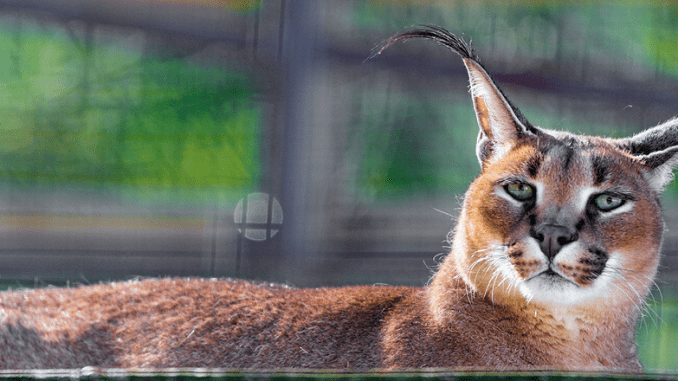
BUFFALO, New York, October 23, 2021 (ENS) – A conviction for trafficking African wild cats has landed a New York man in prison for 18 months for violating two federal laws – the Lacey Act and the Animal Welfare Act.
“The purpose of the Lacey Act and the Animal Welfare Act is to protect fish, wildlife and other animals, especially those that may be endangered, from individuals who seek to profit from trafficking,” said U.S. Attorney Trini Ross for the Western District of New York. “Enforcing these measures is important to ensure that animals, such as the exotic African cats in this case, are safeguarded.”
Christopher Casacci, 39, of Amherst, was doing business as ExoticCubs.com, through which he advertised, imported and sold exotic African cats.
Prosecutors were able to prove that between February and June of 2018, Casacci imported and sold dozens of caracals, Caracal caracal, and servals, Leptailurus serval, for $7,500 to $10,000 each. The eventual owners are likely to have paid at least twice that price.
Casacci claimed that he was operating as a big cat rescue organization in an attempt to avoid New York prohibitions against possessing and selling wild animals.
He falsified transport documents to hide the true species of the cats, instead calling the animals domestic crossbreeds, such as Bengal cats, a hybrid of a domestic cat and a leopard cat, or Savannah cats, a hybrid of a domestic cat and a serval.
Caracals, also called desert lynx for their extended, hair-tipped ears, are wild cats native to Africa that grow to about 45 pounds. Servals, also wild cats native to Africa, grow to roughly 40 pounds. All of the animals were sold while still kittens. Despite their size and wild nature, Casacci marketed them as “house pets.”
Prosecutors showed that multiple kittens imported by Casacci died while in his care or days after he sold them, and many live kittens were seized from Casacci during the investigation. The seized animals are now permanently residing within accredited animal sanctuaries.
Casacci was not approved to sell the cats under the U.S. Animal Welfare Act.
“Selling wild animals as pets not only breaks the law, but also endangers local communities and environments,” said Assistant Attorney General Todd Kim of the Justice Department’s Environment and Natural Resources Division. “The Department of Justice is dedicated to protecting the public and our native wildlife from the irresponsible actions of wildlife traffickers.”
Casacci was previously indicted for his actions in January of 2020. The investigation was conducted by the U.S. Fish & Wildlife Service’s Office of Law Enforcement, under the direction of Special Agent in Charge Ryan Noel, and the New York State Department of Environmental Conservation, Bureau of Environmental Crimes Investigation.
Caracals and Servals in Demand as House Pets
Both species are protected under the Convention on International Trade in Endangered Species, CITES, and their commercial possession and sale is restricted under New York state law.
Caracals in Asia are included in CITES Appendix I, which prohibits virtually all international trade. Populations in African range states are included on Appendix II, which allows limited and regulated trade.
Hunting of both species is prohibited from India and Pakistan in the east, across the entire Middle East and across northern Africa to Morocco in the west.
While survival of the caracal was classified as Least Concern in the Arabian Peninsula in 2011, the species has been listed as Endangered in Jordan since 2000. It was found to be Critically Endangered in Pakistan in 2004, and in Morocco in 2003.
Caracals vanished from Kuwait as of 2013; the species is believed to be on the verge of extinction in many parts of North Africa.
Still, as of 2011 Caracal was common and stable in central and southern Africa, a large fraction of its global range. Because the declines are localized and none cause much of a range loss, the species is considered of Least Concern overall, according to the International Union for the Conservation of Nature, IUCN, which maintains the Red List of Threatened Species.
The Serval, too, is classed as of Least Concern on the IUCN Red List. It lives in the forests, savannahs, wetlands and grasslands of sub-Saharan Africa. Loss and degradation of wetlands inhabited by the rodents they eat is the major threat to servals, and the international pet trade appears to be an emerging threat.
“Wildlife trafficking is decimating the world’s natural resources, so it is essential we work with our partners to put a stop to these types of illegal activities,” Assistant Director Edward Grace of the U.S. Fish and Wildlife Service’s Office of Law Enforcement said. “This will help protect against risks to human health and safety and to native wildlife and their habitats and ensure future generations can enjoy and benefit from our cherished wild heritage.”
Featured image: A male caracal at Sikypark, a Swiss animal rescue park. October 26, 2019 (Photo by Tambako)



